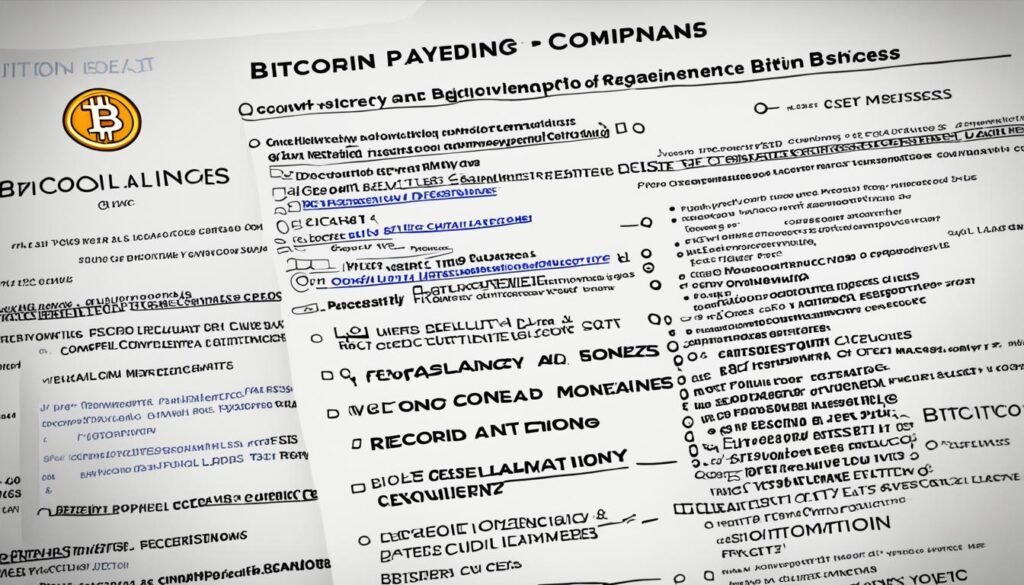Bitcoin and cryptocurrency are changing fast, making it key to understand compliance. In the U.S., many agencies have rules over transactions, causing confusion. This situation includes shifting definitions and laws for licensing and risk management strategies.
The Office of Foreign Assets Control (OFAC) and the Financial Crimes Enforcement Network (FinCEN) fined Bittrex over 24 million dollars. This was for not following the Bank Secrecy Act (BSA) and anti-money laundering (AML) laws. Also, the former CEO of BitMEX was fined 10 million dollars and got six months of home detention for breaking the BSA.
The Department of Justice (DOJ) is cracking down on illegal crypto activities. This shows how important it is to protect consumers and investors. Bitcoin businesses must follow digital asset rules and report to the IRS. Staying in line with KYC, AML, and tax laws is key for staying compliant in the bitcoin industry.
Key Takeaways
- Navigating the complex regulatory environment requires deep understanding and strategic compliance.
- Multiple federal and state agencies claim jurisdiction, leading to regulatory gaps and overlaps.
- Significant fines highlight the importance of adhering to the Bank Secrecy Act and AML laws.
- DOJ’s focus on illegal activities emphasizes the need for robust consumer and investor protections.
- Compliance with evolving KYC, AML, and tax laws is crucial as digital assets face increased scrutiny.
Overcoming Regulatory Challenges in Bitcoin Industry: Best Practices
Dealing with crypto regulations is tough for Bitcoin businesses. Bitcoin, the top decentralized virtual currency, faces a lot of scrutiny from regulators. The global rules for bitcoin vary a lot, with different rules for how to operate.

The Atlantic Council’s Cryptocurrency Regulation Tracker shows that most countries are looking at their rules. But, only a few have clear rules to protect users. There’s a big gap in how rich and poor countries handle digital asset compliance_.
In rich countries, about 64% have rules on taxes, fighting money laundering, protecting consumers, and getting licenses. But in middle-income countries, only 11% do. In low-income countries, none have these rules.
| Category | Advanced Economies | Middle-Income Countries | Low-Income Countries |
|---|---|---|---|
| Taxation | 64% | 11% | 0% |
| Anti-Money Laundering | 64% | 11% | 0% |
| Consumer Protection | 64% | 11% | 0% |
| Licensing | 64% | 11% | 0% |
Bitcoin companies need to make their own compliance plans. These plans should focus on meeting all the rules, with strong checks and due diligence. With worries about stability, safety, and crime growing, it’s key to improve AML checks. Working closely with regulators and showing how solid your operation is can build trust and follow the rules in the Bitcoin world.
7 Key Compliance Requirements for Bitcoin Businesses You Should Know
Bitcoin businesses face a complex set of rules to follow. It’s key to understand these rules to run smoothly and avoid legal trouble. Here are seven main compliance requirements for bitcoin businesses:

- Varied Definitions and State Requirements: Bitcoin businesses must grasp the different meanings of “virtual currency” across states. This affects how they follow crypto industry rules.
- Asset Classification: Figuring out if a digital asset is a security, commodity, or derivative is crucial. This decision shapes how a company meets bitcoin compliance and deals with agencies like the SEC and CFTC.
- IRS Reporting Framework: Following the IRS’s rules for digital currencies is a must. Proper reporting keeps a business in line with tax laws and avoids fines.
- Internal Policies for Digital Asset Custody: Having strong policies for handling digital assets is essential. Tailoring these policies to fit specific needs boosts security and compliance.
- Engagement with Regulatory Entities: Bitcoin businesses must keep in touch with groups like the SEC’s FinHub. This helps them stay updated on bitcoin regulatory updates and get advice on following the rules.
- Licensing and Registration Requirements: It’s crucial to check if extra licenses or registrations are needed to operate. Different federal agencies, like the CFTC and FTC, have their own rules.
- Alignment with Board Strategies: Companies must make sure their digital asset plans and risk levels match their board’s goals. Good communication helps make informed choices and adjust strategies as needed.
The rules for bitcoin are always changing. Keeping up with the latest updates and having a strong compliance plan helps businesses succeed in this shifting landscape.
| Country | Regulatory Body | Framework Highlights |
|---|---|---|
| United States | SEC, CFTC, IRS | SEC takes action; IRS gives tax advice; CFTC oversees commodity platforms. |
| Canada | CSA | First to approve Bitcoin ETF; sets clear crypto rules. |
| Japan | FSA | Sees cryptocurrencies as legal property; strict AML/CFT rules. |
| Australia | AUSTRAC | Views cryptocurrencies as legal property; subject to capital gains tax; AML/CTF rules apply. |
| Singapore | MAS | Classifies cryptocurrencies as property; exchanges need MAS license. |
| South Korea | KOFIU | Exchanges need registration; limits on privacy coins. |
| Brazil | Brazilian Central Bank | Allows cryptocurrencies as payment method. |
Demystifying Anti-Money Laundering (AML) Regulations for Bitcoin Transactions
Anti-Money Laundering (AML) rules are key in the Bitcoin world. They help stop bad activities like market manipulation and funding terrorists. As more people use cryptocurrency, businesses and Virtual Asset Service Providers (VASPs) must follow AML rules for bitcoin transactions. This means watching and checking transactions, following blockchain rules, and using guidelines for virtual currency to lower crime risks.
Compliance officers are crucial in setting up strong AML programs. They use tools from others to watch over transactions well. Rules say U.S. exchanges must watch the market like traditional financial firms do. This helps catch and stop suspicious actions. It’s important because of risks like wash trading and pump-and-dump schemes in Bitcoin.
The Bank Secrecy Act (BSA) of 1970 is a key AML law in the U.S. It requires strict following to avoid big penalties. Being proactive means having skills like good investigation skills, analytical skills, and writing clear Suspicious Activity Reports (SARs). Also, using AI and machine learning helps watch activities in real-time. This can spot suspicious patterns early.
The rules for AML are always changing. It’s important to be proactive in following them. Using old and new strategies keeps operations safe and builds trust with clients. Groups like the Financial Action Task Force (FATF) set AML standards. It’s important for cryptocurrency exchanges to keep up with these standards.
For high-risk customers, Enhanced Due Diligence (EDD) is key. This means deeper checks and always watching transactions. By using these detailed methods, companies can fight market manipulation, keep their operations safe, and make a safer place for virtual currency.
Ultimate Guide to Know Your Customer (KYC) Procedures in the Bitcoin Ecosystem
Know Your Customer procedures are key in the Bitcoin ecosystem. They help crypto exchanges and others check who their customers are. We’ll look at the basics of KYC in bitcoin, following bitcoin laws and ensuring blockchain compliance.
In the U.S., crypto exchanges ask for personal info like your name and address. They also want to see your ID, like a passport or driver’s license. Some exchanges might ask about your money’s source or why you’re buying crypto, to follow bitcoin laws.
The Financial Action Task Force (FATF) says unusual transactions might be illegal. This helps keep KYC checks strict. For example, CoinDCX in India has made signing up 99% faster with Onfido’s Real Identity Platform, serving over 3.4 million customers.
“The volume of criminal transactions involving cryptocurrencies reached a record high of $20 billion last year, with 44% linked to sanctioned entities.”
| Exchange | KYC Process | Verification Time |
|---|---|---|
| Coinbase | Personal data collection and government-issued ID verification | 10 minutes |
| Binance | Source of funds and purpose of transaction details | Less than 1 hour |
| CoinDCX | Verification using Real Identity Platform | 5 minutes |
FinCEN says crypto businesses must follow AML/KYC rules to stop illegal transactions. The table shows how good blockchain compliance and KYC can make signing up faster. This follows bitcoin laws well.
Maximizing Returns: Tax Strategies for Investing in Bitcoin
Investors in Bitcoin need to understand complex tax rules to make the most of their investments. The Infrastructure Investment and Jobs Act, starting January 1, 2024, requires reporting crypto transactions over $10,000 to the IRS.
Knowing how to classify gains is key to smart tax planning. Short-term gains, from assets held under a year, are taxed at rates from 10% to 37%. Long-term gains, from assets held over a year, have lower rates of 0%, 15%, or 20%, based on your income.
Strategies to boost returns include:
- Tax-loss harvesting – Using losses to offset gains.
- Keeping assets over a year for lower tax rates.
- Using deductions and tax credits to your advantage.
- Choosing the best cost basis method, like FIFO or Specific Identification.
- Using IRAs for tax benefits.
- Donating to charity for tax perks.
Keeping up with digital currency laws is also crucial. You’ll need forms like Form 1040, Schedule D, and Form 8949 for taxes. Make sure to document all important details for accurate reporting and to be ready for audits.
As Bitcoin has grown since 2009, staying updated with tax rules and regulations is vital. This helps in planning strategically, maximizing profits, and following the law.
10 International Regulations Impacting Bitcoin Transactions Globally
Bitcoin transactions worldwide are shaped by many different rules. In fact, 55% of 60 countries let people use cryptocurrency legally. Another 28% have some bans, and 17% have total bans.
The European Union has made big changes with its Markets in Crypto-Assets Regulation (MiCA). This has led half of the G7 countries to make their own rules for stablecoins, mostly tied to the US dollar. Working together with groups like the Financial Stability Board helps countries share ideas on digital currency regulations.
In the US, both federal and state groups like the SEC watch over digital assets. The SEC’s Crypto Assets and Cyber Unit grew in May 2022 to keep a closer eye on the industry. They have taken action against big names like Bittrex, Coinbase, Binance, and Kraken. These actions aim to protect investors and fight crypto market abuse.
Worldwide, 19 out of 60 countries have strong rules for things like taxes, fighting money laundering, protecting consumers, and getting licenses. But, some countries are still catching up, with only 13% having all these rules. This shows we need more countries to follow the global cryptocurrency policy rules.
In the G20 countries, over half (60%) have made cryptocurrencies legal, but there’s still a lot to talk about. As rules change, businesses need to keep up with the latest global guidelines. They must adapt to the evolving global cryptocurrency policy scene.
By 2024, it’s expected that 70% of the countries studied will change their crypto rules a lot. This shows how important it is to follow regulatory requirements for bitcoin. It helps businesses play a big part in the global Bitcoin world.
Understanding Reporting Obligations for Bitcoin Exchanges and Platforms
Bitcoin exchanges and platforms have to follow strict rules to be transparent and protect consumers. The Financial Crimes Enforcement Network (FinCEN) and the IRS set these rules. They make sure blockchain technology is used right.
FinCEN says you must report any transactions over $10,000. Starting in 2025, the IRS will ask brokers to report crypto sales and exchanges. This shows how digital currencies are being watched closely.
The Travel Rule is another rule that requires sharing info on users who send more than $3,000 in cryptocurrency. Not following these rules can lead to big fines. For example, Upbit and Coincheck faced big penalties for not fighting money laundering well.
Paxful, a peer-to-peer crypto exchange, has a strong Know Your Customer (KYC) policy. It depends on how much you trade. This shows how important it is to follow rules and keep the platform safe.
Here’s a detailed look at some key reporting requirements:
| Requirement | Applicable Regulation | Description |
|---|---|---|
| CTRs | FinCEN | Report transactions equal to or above $10,000 |
| Travel Rule | FATF | Identify and share info on users involved in transfers over $3,000 |
| IRS Reporting (2025) | IRS | Report sales and exchanges of cryptocurrency transactions |
| KYC Policies | Various | Tiered policies based on transaction volumes |
It’s key for businesses to follow these rules to keep going and keep people trusting them. They need to keep their rules up to date with the law.
Decoding Legal Frameworks for ICOs in the Bitcoin Ecosystem
ICOs have become key in the Bitcoin world, linking new ideas with investment chances. As ICOs grew, the need for strong legal rules for ICOs became clear. This was due to regulatory checks and the unique nature of crypto assets. In the beginning, there were no clear rules, causing confusion and varied rules in different places.
ICOs led to debates on if some tokens should be seen as securities. This led to rules to stop fake ICOs. Now, the rules for digital currencies have changed, focusing more on token types and securities laws. Around the world, exchanges and service providers must get licenses and register, making things more open and protecting investors.
| Consideration | Details |
|---|---|
| Token Classification | Compliance with securities laws and registration requirements |
| Payment Methods | ICOs usually take cryptocurrencies like Ether and Bitcoin, not regular money |
| Token Standards | ERC-20 token standard is widely used for creating tokens on Ethereum |
| Institutional Participation | More interest is coming from clear rules and better infrastructure |
Rules for crypto assets stress the need to follow these laws to avoid legal trouble. ICO funds often come in Bitcoins or Ether, showing their link to the Bitcoin world. The rules for ICOs are still changing, with help from international cooperation to tackle issues like money laundering and tax evasion.
Regulatory sandboxes are now key, offering safe spaces for fintech startups and crypto projects to try new things under watchful eyes. Even with progress in setting up rules for digital currencies, new challenges come up, like in DeFi, stablecoins, and deals across borders. Dealing with these new issues needs flexible rules that match the fast-changing crypto world.
Ensuring Compliance: Actionable Steps for Bitcoin Businesses
For Bitcoin businesses, ensuring compliance is key. It means knowing the regulatory requirements in the crypto industry well. Having a strong compliance framework for bitcoin is vital. It helps avoid fines and keeps trust with users and regulators.
- Due Diligence: Check customers and their deals deeply. With $14 billion in crypto crimes in 2021, this is very important.
- KYC Procedures: Use strict Know Your Customer (KYC) checks to verify identities. This helps stop bad activities.
- AML Compliance: Use Anti-Money Laundering (AML) programs that fit your business size and type. Include tests and training.
- Privacy Norms: Follow rules for privacy and data safety. Keep customer info safe.
- Appoint Compliance Officers: Hire experts in finance, policy, and law to fight AML/CFT threats.
- Utilize Technology: Use tech like digital ID checks and AI for better compliance.
- Engagement with Regulators: Always talk to regulators. US firms must follow the Bank Secrecy Act and register with FinCEN, SEC, and CFTC.
- Regular Audits: Get outside audits to find and fix compliance issues.
- Stay Informed: Keep up with new rules. The Anti-Money Laundering Act (AMLA) now includes crypto businesses.
A good compliance framework for bitcoin means managing stakeholders well. It’s important to have clear roles and strong communication between teams and regulators for legal bitcoin transactions.
In conclusion, making compliance a key part of your Bitcoin business is crucial. It should be part of your daily operations and strong against new regulatory requirements in the crypto industry. Following these steps helps Bitcoin businesses deal with rules and build trust in the crypto world.
| Key Steps | Description |
|---|---|
| Due Diligence | Comprehensive evaluation of customers and transactions. |
| KYC Procedures | Rigorous processes for identity verification. |
| AML Compliance | Tailored Anti-Money Laundering programs with independent testing and training. |
| Privacy Norms | Ensuring robust privacy and data security measures. |
| Compliance Officers | Appointment of officers with diverse backgrounds in finance, policy, and law enforcement. |
| Utilize Technology | Employ advanced compliance technologies like digital identity verification and AI. |
| Regulatory Engagement | Continuous engagement with regulators and adherence to key standards like the BSA. |
| Regular Audits | External audits to identify and fix compliance gaps. |
| Stay Informed | Keep updated with the latest regulatory changes and updates. |
Conclusion
Bitcoin is becoming a big part of our financial world. It’s important to have clear rules for it. This makes the environment safe and open.
Groups like the Securities and Exchange Commission (SEC) and the Commodity Futures Trading Commission (CFTC) are working hard. They’re making new rules to manage the risks of cryptocurrency.
For those in the business and investing in Bitcoin, it’s key to know the laws. The SEC recently approved 11 Bitcoin ETFs. This shows how rules are changing. The CFTC has been working on regulating Bitcoin for years.
In 2023, the SEC took action on 26 crypto-related cases. They also grew their Crypto Assets and Cyber Unit by 66% in 2022. Having a strong plan for digital assets is vital.
The National Cryptocurrency Enforcement Team (NCET) was set up in 2021. It deals with fraud and money laundering. This shows why businesses need to be ahead of the game.
There are many new bills being looked at. They cover everything from reporting to environmental studies on mining. Businesses must be ready to adapt and stay ahead in the changing world of Bitcoin and digital assets.
FAQ
What is Bitcoin regulation?
Bitcoin regulation means the laws and rules set by governments and groups to manage Bitcoin and other digital currencies. These rules cover how to buy, trade, store, and use Bitcoin as money.
Why is compliance important in the Bitcoin industry?
Compliance is key in the Bitcoin world to follow the law, protect buyers, stop fraud, and fight illegal acts like money laundering. It builds trust with customers and regulators, lowering the risk of legal trouble.
What are the main regulatory challenges faced by Bitcoin businesses?
Bitcoin companies face issues like figuring out if Bitcoin is a security or commodity, meeting IRS reporting needs, and keeping up with changing laws. They need strong compliance plans to handle these complex rules.
How can Bitcoin businesses ensure AML compliance?
Bitcoin companies can follow AML rules by having strong AML programs, using blockchain tools to watch transactions, and following the Bank Secrecy Act. They should also train staff and update AML policies regularly.
What are Know Your Customer (KYC) procedures in the Bitcoin ecosystem?
KYC means checking who customers are to stop fraud, money laundering, and other bad acts. Good KYC includes keeping detailed records, watching customer behavior, and following state and federal rules.
What are the tax compliance requirements for Bitcoin investments?
For Bitcoin investments, you must report crypto trades to the IRS, understand taxes on gains, and know how to classify crypto income. Making a smart tax plan helps follow the laws on digital assets.
How do international regulations impact Bitcoin transactions?
International rules affect Bitcoin deals by setting different standards for crypto use in different places. This includes AML rules, seeing crypto as legal property, and specific reporting needs. Keeping up with global rules is important for Bitcoin users worldwide.
What are the reporting obligations for Bitcoin exchanges and platforms?
Bitcoin exchanges and platforms must give detailed info on trades and customer deals, follow AML and KYC rules, and get ready for new IRS reporting. They need to update their systems for these rules.
What are the legal frameworks for Initial Coin Offerings (ICOs)?
ICO legal frameworks help decide if token sales are securities and follow registration rules. As rules get stricter, ICO businesses must know and follow the law to avoid legal trouble.
What steps can Bitcoin businesses take to ensure compliance?
Bitcoin companies can follow the law by doing careful checks, having strong audits, following AML and KYC rules, and talking with regulators. Keeping compliance policies up to date and training staff is also important.











